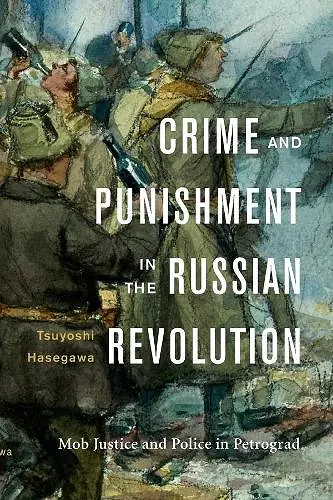Crime and Punishment in the Russian Revolution
Mob Justice and Police in Petrograd
Format:Hardback
Publisher:Harvard University Press
Published:27th Oct '17
Currently unavailable, and unfortunately no date known when it will be back

The book Crime and Punishment in the Russian Revolution examines the impact of violent crime on society during a tumultuous historical period, revealing the struggles of ordinary people.
In Crime and Punishment in the Russian Revolution, Tsuyoshi Hasegawa provides a compelling exploration of the tumultuous year following the abdication of Tsar Nicholas II. While the February Revolution of 1917 sparked jubilant celebrations among Russians from diverse backgrounds, the atmosphere shifted dramatically within just a year. As Lenin's Bolsheviks took control, the once-vibrant streets of Petrograd became eerily quiet, reflecting a society gripped by fear and civil unrest. The initial optimism gave way to a stark reality where lawlessness prevailed, and citizens retreated into the shadows, wary of the escalating violence.
Hasegawa delves into the impact of violent crime during this revolutionary period, highlighting how the dissolution of the tsar's police force led to a breakdown of order. The Provisional Government's attempts at liberal reforms inadvertently created a vacuum that allowed crime to flourish. Gangs roamed freely, mass prison escapes became commonplace, and vigilante justice emerged as ordinary people took matters into their own hands amidst the chaos. The book paints a vivid picture of a society struggling to maintain civility in the face of overwhelming disorder.
As the Bolsheviks rose to power in the October Revolution, their lack of effective strategies to restore order only exacerbated the situation. Hasegawa illustrates how the regime labeled escalating crime as “counterrevolutionary activity,” justifying the use of brutal tactics by the secret police. This response not only intensified the violence but also set the stage for the emergence of a repressive Communist dictatorship, marking a significant transformation in Russian society during this critical historical moment.
An innovative study that’s about more than its title would suggest. Tsuyoshi Hasegawa shows how the social breakdown that followed the February Revolution triggered a surge in crime that the provisional government could not reverse. -- Andrew Stuttaford * Wall Street Journal *
Hasegawa is one of our leading historians of the February Revolution…[He] makes a strong case that the catastrophic social breakdown, most especially the violent crime that pervaded life in Petrograd after the collapse of the monarchy, ‘served as a stepping-stone toward the creation of the pervasive instrument of terror that became an integral part of the Communist dictatorship.’ -- Joshua Rubenstein * New York Times Book Review *
Tsuyoshi Hasegawa’s Crime and Punishment in the Russian Revolution offers a street-level analysis of the chaos that engulfed the Russian capital in 1917…The mob in Hasegawa’s account is no mere bit player on the revolutionary stage of 1917 but a primal agent of social transformation. -- Daniel Beer * Times Literary Supplement *
Detail[s] meticulously the social history of crime in Petrograd in the months between the February Revolution and the October Revolution, the latter of which would see the rise of the Bolsheviks. Hasegawa’s book is a great reminder of the ways in which revolutionary fervor often betrays its own cause and makes life worse for those caught in the crosswinds…Hasegawa’s book is essential reading. -- Jerrod A. Laber * American Conservative *
[A] compelling book. -- Robert Levgold * Foreign Affairs *
This book makes a fundamental contribution to our understanding of the Russian Revolution by revealing the violent, chaotic lived experience of the revolution in the capital city. In a narrative full of colorful characters and stories, Hasegawa gives us a street-level view of the collapse of state authority that cleared the way for the Bolshevik seizure of power. -- Eric Lohr, American University
Hasegawa addresses the very important, largely ignored thus far, role of crime and the breakdown of social order and public safety. In doing so he changes the way we think and write about the Russian Revolution, making this one of the more original things I have seen in a very long time. -- Rex Wade, George Mason University
ISBN: 9780674972063
Dimensions: unknown
Weight: unknown
368 pages